I taught Intermediate Greek for the first time this term, so everything was new to me, but there was one particular new thing that succeeded beyond my wildest dreams — these individual text presentations.
Goals:
1) I wanted students to learn to use Greek resources — commentaries, lexicons, maybe even an apparatus criticus.
2) I wanted students to see a wider range of authors and genres than we would otherwise see
3) I wanted students to inject some of their own outside passions and interests into the course
The full assignment is available here, but in short, students picked any text that interested them and that wasn’t Plato’s Symposium (our main text for the class). Then they picked a short passage of that text and prepared the text and presented it in class. Finally, they all wrote a reflection paper about the experience and what they learned.
The texts students chose ran the gamut from Homer to tragedy to Aristotle to Plotinus to the New Testament (plus the non-canonical Gospel of Peter) to Athanasius and Justin the Martyr. This was part of the goal of the project (though I could not have anticipated quite the range we ended up with!) — I know that some of my students will not continue past Intermediate Greek, but that many of them will either need or want to read Greek texts on their own. This allowed them to navigate real texts (i.e., not their very helpful intermediate book with all the vocab in the back and notes below the text) with help from me, and it forced them to learn how to look up words and grammar concepts on their own.
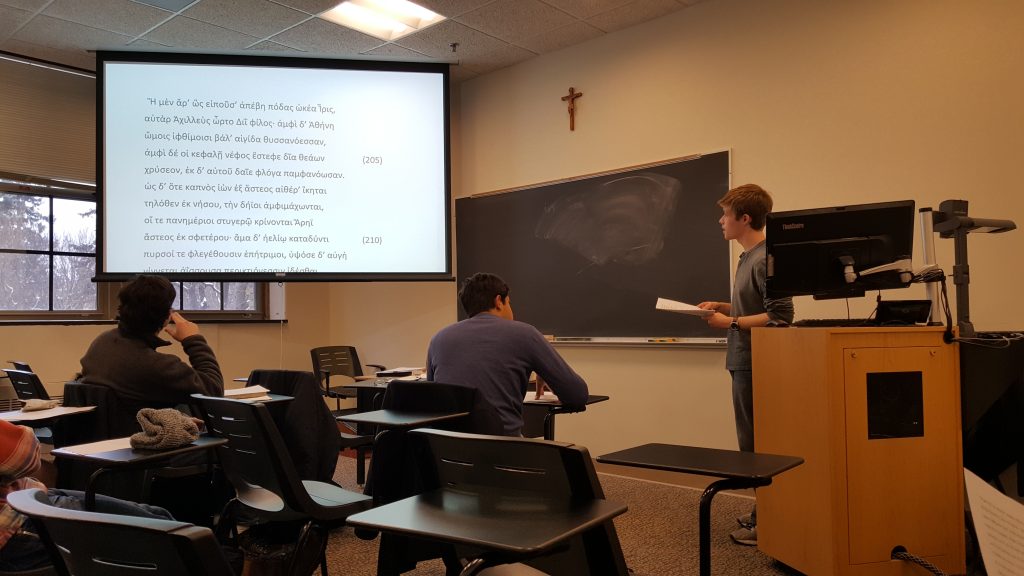
The epic simile about the time when Achilles’ head caught right on fire! 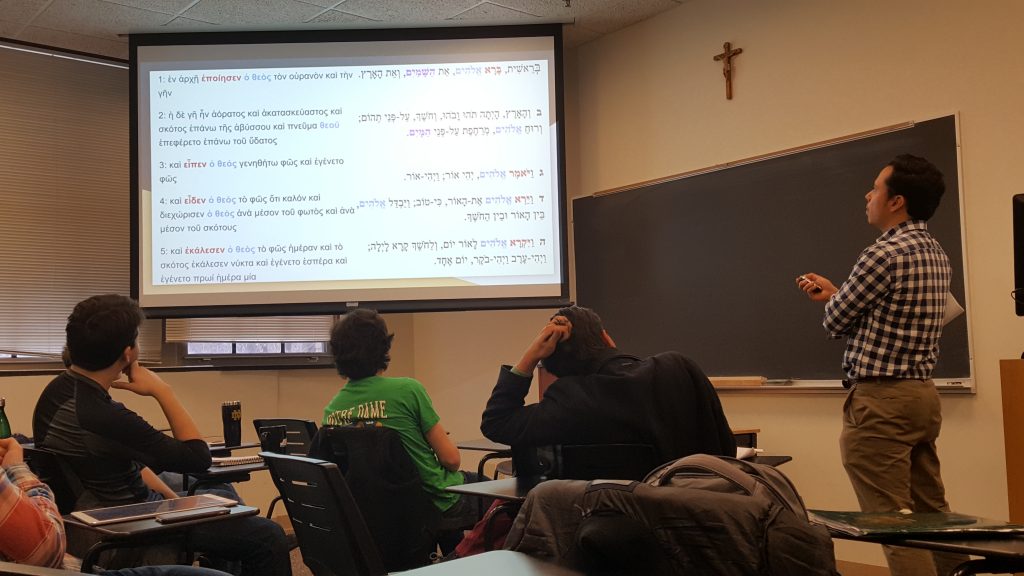
NBD, just a comparison of the Greek Septuagint and the Hebrew Bible! 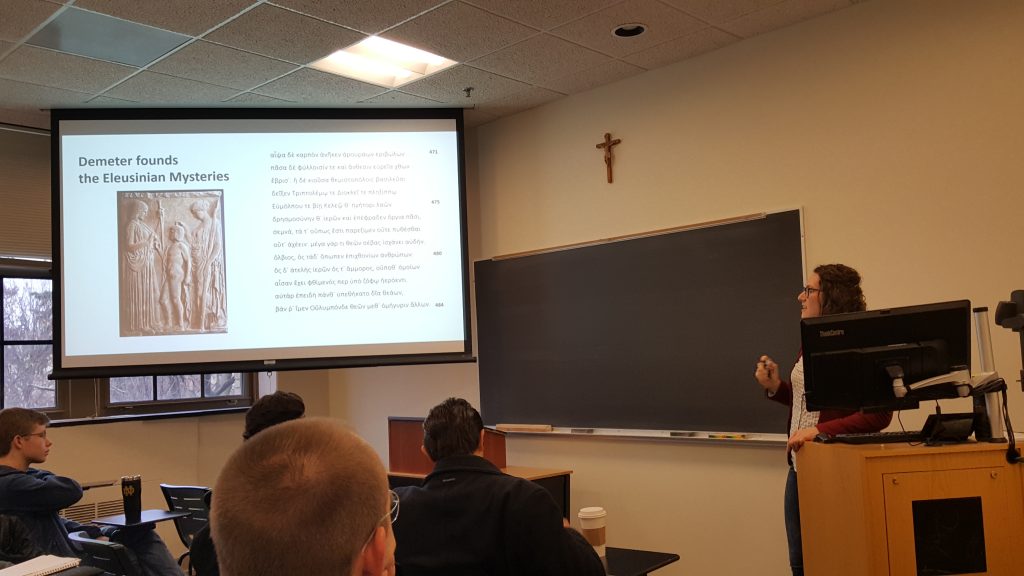
Demeter and the Eleusinian Mysteries! 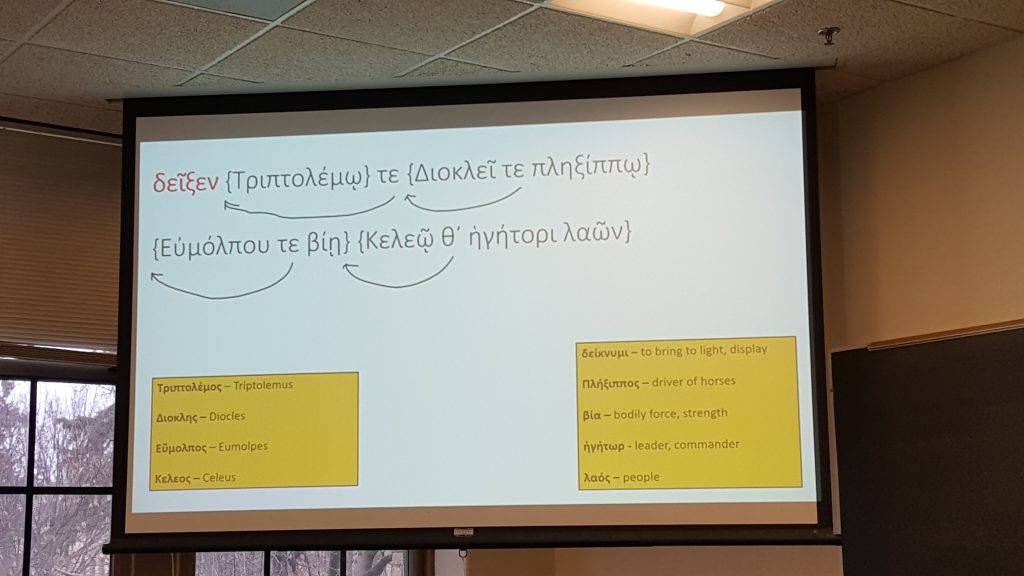
Check out this LEGIT breakdown of the structure of the Greek in the Homeric Hymn to Demeter! 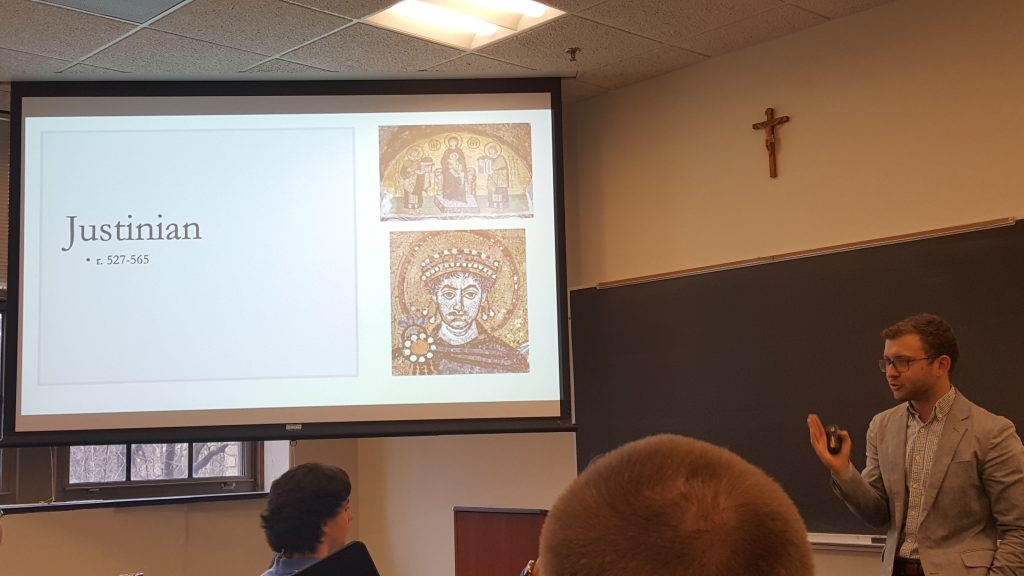
Justinian rocking a sweet set of earrings while Evan rocks his presentation 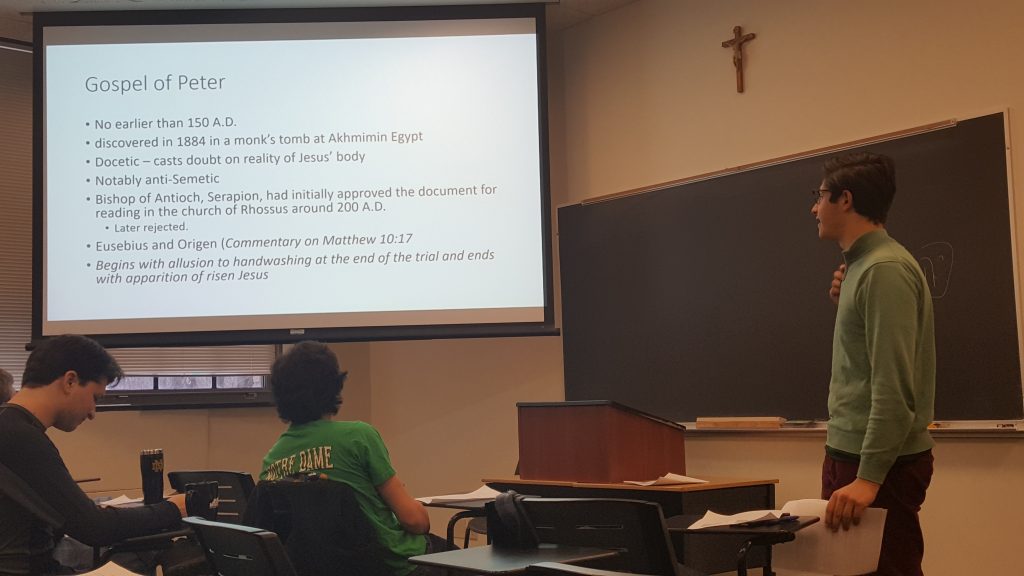
A little non-canonical Gospel, really expand some literary horizons! 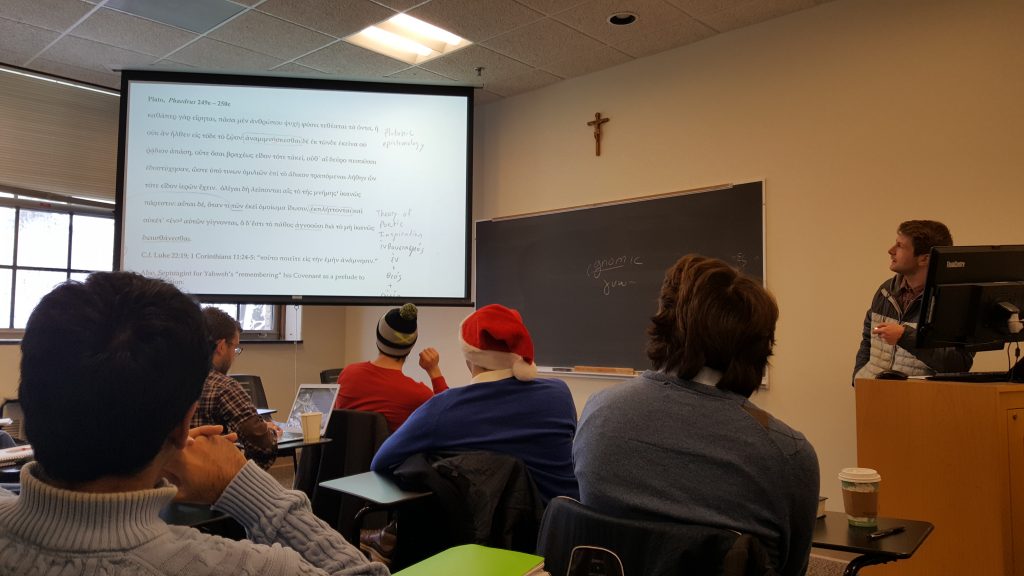
Plato’s Phaedrus and a study of recollection (ἀναμιμνήσκω) 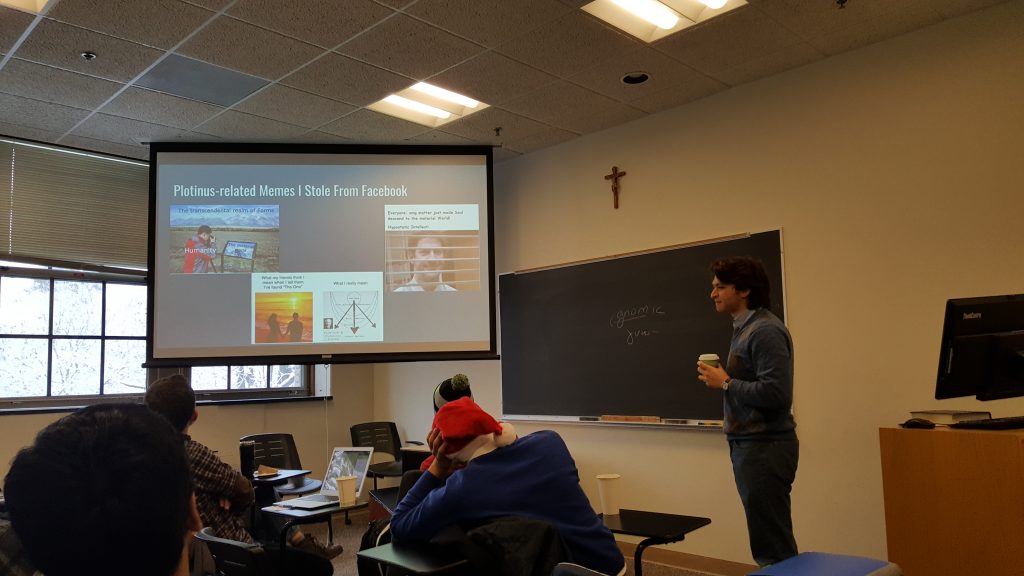
Plotinus memes! 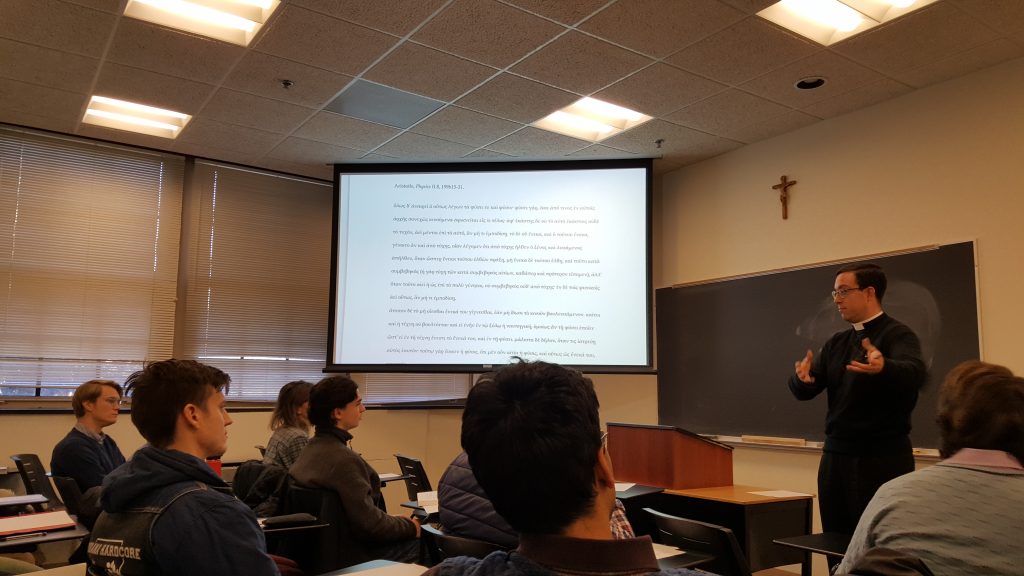
Aristotle’s Physics 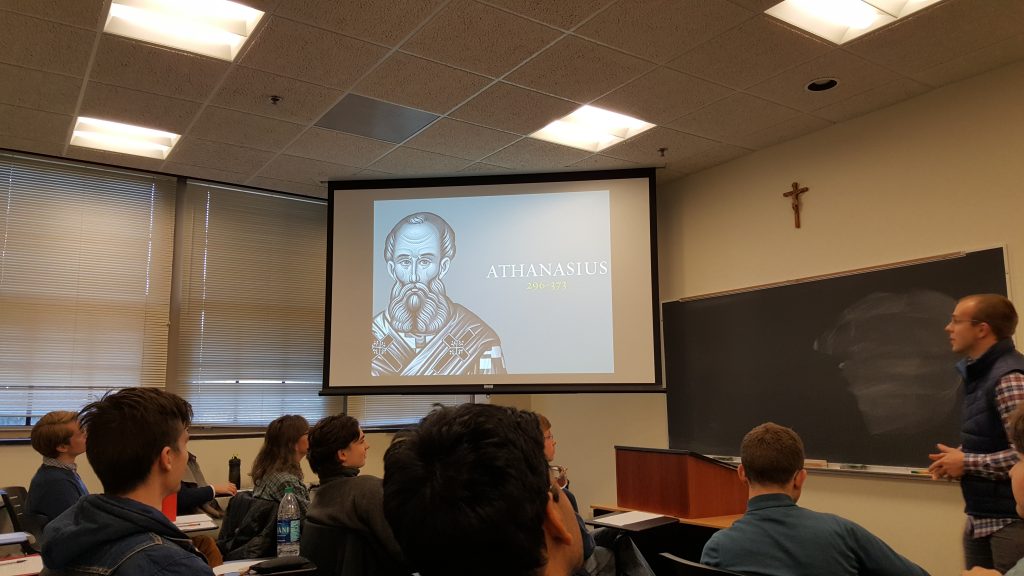
Athanasius! 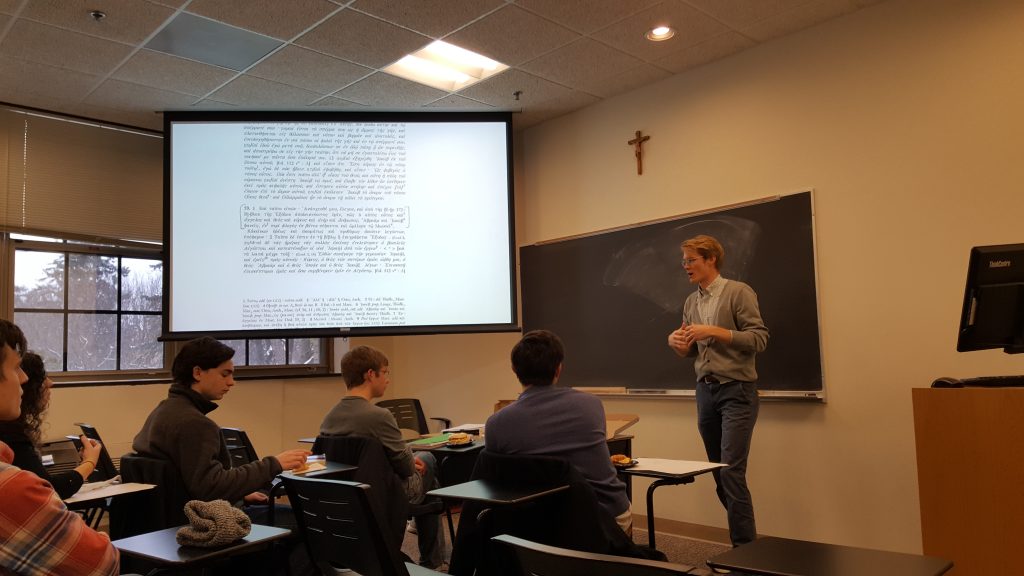
Wherein we explored Justin Martyr as well as what’s going on in an apparatus criticus 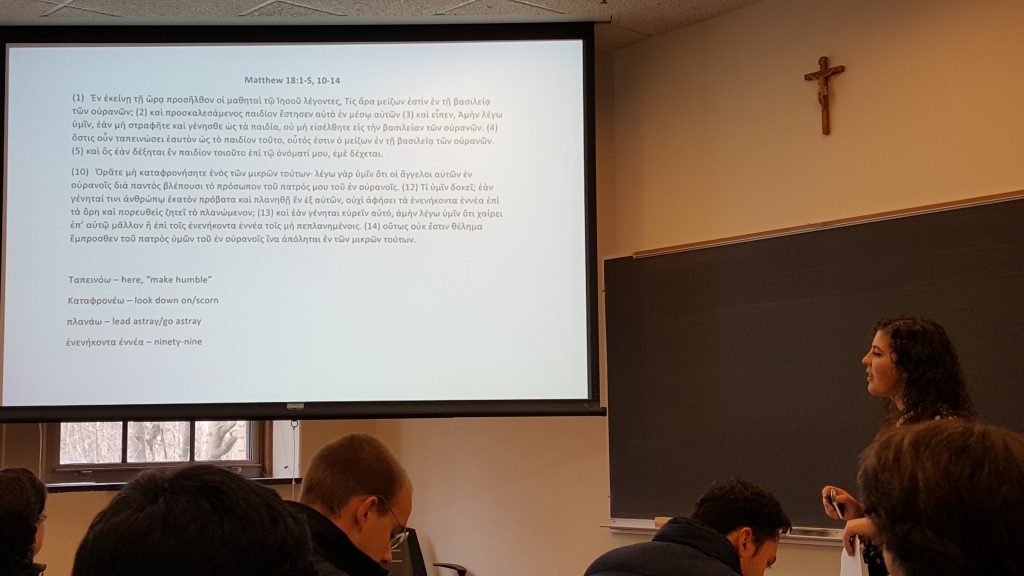
The parable of the lost sheep
I will say, an unanticipated challenge from my end, as the instructor, was that these presentations took much longer than I anticipated. I told them to prepare a 10-ish minute presentation, and these presentations regularly took the entire 50-minute class period, because the rest of the class was so engaged with the text and had so many questions and comments about both the Greek and the content of the texts. This was a wonderful problem to have (“oh no, my students are too engaged with their Greek!”) but it did mean that we weren’t reading a lot of Plato in class.
So, to the real heart of this assignment: the reflection papers. This is where my heart absolutely melted — they were so thoughtful and the students got exactly the things I had hoped for from this assignment (and then some!).
First of all, I want to highlight this passage from one of my student’s reflection because everything about it spoke to what I hoped this assignment would accomplish
| “I think that the most rewarding aspect of this project for me was discovering how much even a Greek novice like myself can glean from comparing ancient texts with their English translations. Upon finding that translation itself remains difficult after a year of introductory Greek, it can be easy for many to despair of ever attaining any tangible benefits from so much time, labor, and frustration poured into study; yet the skills I found myself able to employ for this project strike me as no small reward. Even if I don’t end up continuing on with Greek in a formal academic setting (don’t worry, I plan to continue), I will always know that I possess the tools to analyze and assess English translations and to recognize (even dispute!) the interpretive judgments that these make, whether grammatical, literary, moral, or philosophical. No longer can anyone wield “the Classics” at me like they’re some esoteric corpus that I don’t have an initiate’s access to—that fact in and of itself is incredibly empowering.” |
Oh my goodness!
For the rest of these comments, I’ve tried to arrange them into categories that loosely map onto my learning objectives. I include these in hopes that these results might encourage others to try a similar assignment in the future.
Students seeing/sharing their passions and developing confidence as classicists
“Working on this project was perhaps one the most rewarding and enjoyable experiences I have honestly had so far in my higher education…doing this project reminded me why I am pursuing my current academic interest.”
“Hearing what my classmates were interested in made me realize how many options there are for reading Greek other than the conventionally considered authors. I appreciated the breadth of genres we were exposed to from doing this project- it can be difficult to see a variety of texts in any given Greek class because they typically focus on a single period or author, but this class provided both a close reading of Plato and introductions to many genres.”
“I also enjoyed the variety of texts that we were able to see, though it was difficult to immediately jump into most of the texts and begin to navigate them quickly. Still, I was intrigued by the different styles and the range of vocabulary that we were exposed to, particularly with the presentations on the poetry.”
“Overall this was a wonderful project that solidified my academic interests and desires. I was fascinated at how much I had learned since June in both Greek and Hebrew and how the text just came alive in front of me. Comparing the differences in translation opened my eyes to the ways that meaning and nuance is lost in translation, even with a language as rich as Greek.”
“My first reflection on the process of preparing and presenting the Greek text 199b15-31 of Aristotle’s Physics was that it was great fun. I have devoted much time to studying and writing about Aristotle’s philosophy, but until recently my Greek wasn’t good enough to engage the Greek text; it simply would have been too time-consuming. Studying an important passage of the Physics in Greek gave me the sense of being in more direct contact with Aristotle’s mind, and that was a thrill.”
“I was glad that something I was keen about seemed interesting to other people as well. Despite taking more than my fair share of time, I left that presentation sky-high. It was an amazing feeling to have put so much work into something because I cared about it, which I originally didn’t expect, and then to have a group of people, whom I respect, also find it interesting. I learned a lot about critical editions, about translation tools for a new genre, about Mithras, and I even was able to refresh my PowerPoint skills, which I hadn’t used in ages. However, the most important lesson for me was probably to see how my insecurity diminished because I found something I cared about more than I cared about what other people might think of me.”
“I really appreciated this project in general because everyone was able to present on something, they are passionate about. Everyone takes Greek for a different reason and when they are able to show everyone their passion, it makes the class so much more vibrant and exciting (thought it already is). I learned very much from the text presentations of others and was engaged the entire time.”
“The process of learning about this passage and presenting it to the class was definitely useful to me as a burgeoning scholar. One of my goals for my master’s degree is to get to the point where I can comfortably and competently work with the Bible in its original languages, and this process provided an opportunity to do so.”
“Translating this text made me very confident and pleasantly surprised in the amount of Greek I actually know.”
“I was honestly surprised by my ability to answer the majority of these questions. I had not really realized the degree to which I understood the grammar and syntax of Greek. The questions and answers, then, were a big encouragement to me overall and evidence of the progress that this class had already engendered in my understanding of Greek.”
Seeing a range of styles and genres and thinking about the limits of translations (as opposed to reading a text in the original language)
“The process of preparing my text was highly edifying. My familiarity with the text is now categorically richer, I think, than it was before, since any translation, however accurate, is mediated by a whole array of choices and shadows and semblances.”
“The main thing I’ve learned throughout this process is just how inadequate an English translation can be… It was a challenge to balance remaining true to the Greek words and structure of a text on the one hand, and discerning how that text is best translated into English for your audience on the other.”
“Reading portions of the text in the Greek was especially rewarding. In fact, I’m unsure if I would have been able to come to the same theological insights concerning the text if I had not wrestled with the Greek.”
“I certainly got more out of reading Plotinus in the Greek than I would have in English. I’ve found that, especially for ancient philosophers, because the concepts they used were often so different from our vocabulary, much of the difficulty of deciphering the text is due to the translation and the translator’s idiosyncratic word choices, ways of interpreting ambiguous passages, and so on…it begins to become a worthwhile question at some point whether we’re dealing with the issues of the actual text or of its translators and commentators.”
“I hope it is clear from all the above that I got a lot out of this assignment both as a reader of Greek and as a reader of the Bible. From a purely aesthetic perspective, also, I did get a taste of Koine Greek and its particular flavor, which is decidedly more direct and somewhat less artful (or artificial) than the Herodotus and Plato that we have read.”
“One of the more significant differences to me between the English and the Greek text is the greater precision and clarity with which the Greek text is able to communicate the relationships between events.”
“It was helpful to practice reading a different author and realize that it takes a little while to understand how different the style is in the original and how much this affects one’s ability to translate it.”
Reflect on the processes of teaching and learning (not an initial learning objective, but a wonderful side perk!)
“The process of teaching the text was the newest and most challenging component of this project for me. I couldn’t help but think of the expression ‘The highest form of understanding something is being able to teach it’ when I was preparing to present because I had to master every part of the passage- the vocabulary, the grammar, the syntax, the meter, the context, the themes, and its relation to the text as a whole.”
“I really enjoyed preparing my own text to teach to the class. It helped me engage more actively in my Classics studies, by allowing me to share what I had learned with the rest of the class.”
“Overall, I found this project incredibly enjoyable…For me, the most valuable part of this assignment was the presentation. It forced me to delve into the text more deeply and from a different perspective. I think there is immense value in an assignment that forces you to consider how it will be received and understood by your peers.”
“That was an important reminder that presenting and teaching do not require having all the correct answers.”
Navigating new resources
“I spent a lot of time with the Byzantine Reading Room’s Patristic Greek Lexicon. I am really glad to have stumbled across this book, which—but for this project—I wouldn’t have known about or have used it; now I realize how I can use this resource to take a grammatical-historical approach to theology, and have already used it in another one of my classes.”
“I am used to looking at biblical commentaries from my theology classes, but I had never had to use a commentary specifically on the Greek before. The volume that I found was surprisingly accessible, and was helpful in terms of highlighting noteworthy elements in the text that I would not have noticed on my own.”
“In particular I found myself browsing through Perseus and Blue Letter Bible, two website that I actually hadn’t used too much before. I am grateful I now know these two very helpful resources better, and feel more comfortable navigating the data.”
“Having to use a lexicon that was later than Classical Greek forced me to do the work more intimately. I also learned a lot about the nuances of vocabulary in Christian Greek.”


no replies